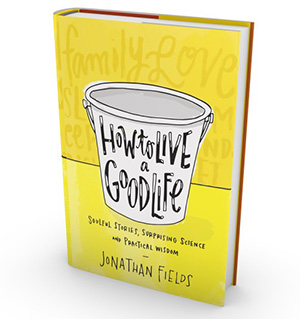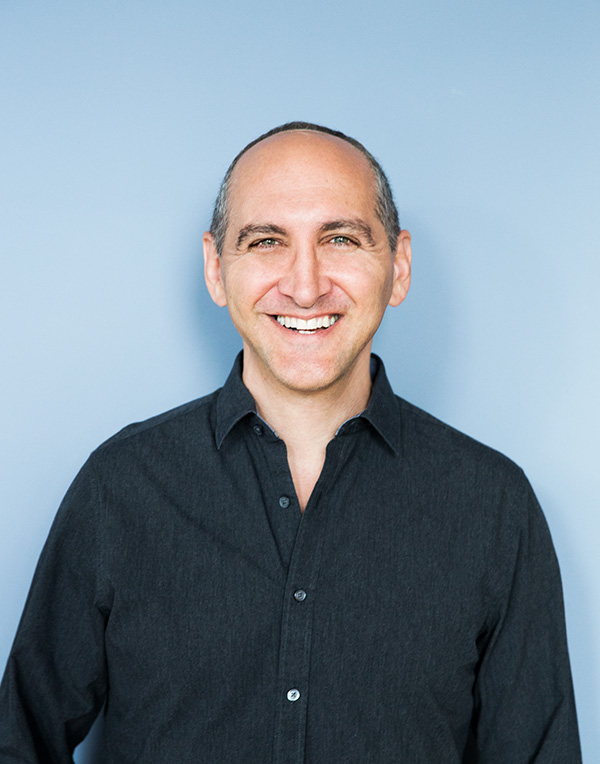
Jonathan Fields
The Good Life
Interview by Kristen Noel, September 12, 2016, New York City
Photographs by Bill Miles
________________________________
Do stuff that matters.
Jonathan Fields
Kristen: About a year or so ago, our paths almost crossed professionally. At that time, I didn’t yet know who you were, but I was intrigued. As I do, I started in on my research. And I have to say — you had me at trampoline.
Jonathan: [laughing] Apparently we have a lot of people at trampoline.
Kristen: To clarify for our audience, I just want to explain that there you were jumping up and down in a video. Looking straight at the camera you said, “I’ve got to talk to you about something really serious.” In that moment, you completely had me with your whimsy, your playfulness, and your down to earth sensibility. I had to know more.
Your bio feels like a roadmap leading to the culmination of this new book about to released, How to Live a Good Life: Soulful Stories, Surprising Science and Practical Wisdom. New York City dad, husband, award-winning author, speaker, media producer, camper, serial entrepreneur, and founder of the mission-driven media and education venture, The Good Life Project.
Let’s begin with your telling us how the son of a hippie, potter mother and a mad academic father goes on to become a corporate attorney and ultimately a man jumping on a trampoline…
Jonathan: …in bare feet.
Kristen: In bare feet, guiding thousands to live purposeful lives.
Jonathan: Yeah. It’s interesting because I turned 50 this year. I’m at a point in my life where it’s like that famous Steve Jobs’s quote, “You connect the dots looking backwards.” You have to have lived enough of life to actually have dots, to see how they weave together.
Kristen: I love that.
Jonathan: I’ve started to reflect a lot and wonder what has been the throughline with all of these things that I have done. When I was a kid, I was an artist. I made my pocket money painting album covers on the back of jean jackets.
Kristen: Do you think we’re hardwired to be entrepreneurs?
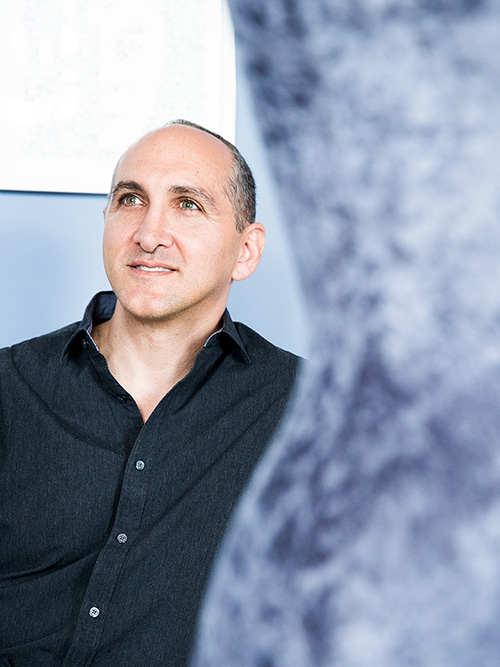
Jonathan: I don’t think we’re hardwired as entrepreneurs. Actually, I don’t even love to use the word ‘hardwired’ anymore, because there’s so much rewiring that can happen. I think a lot of us are predisposed by the time we reach adulthood. We’ve wired ourselves in a way where we’re more comfortable living in a place with sustained uncertainty.
I wasn’t one of the people wired to sit comfortably in that space. I’m breathed by creation and the creative process, but I always suffered pretty greatly along the way. It took me many decades to really understand what I needed to do to be in that place.
Kristen: Well one of our writers, Nan Tepper wrote, “I got here as fast as I could.”
Jonathan: Yes.
Kristen: You practiced law.
Jonathan: I did, which was a bit of an aberration for me because I was also an entrepreneur as a kid. I was always figuring out ways to mix craft and entrepreneurship to earn a living. I figured I didn’t know if I’d practice, but I knew it would give me a great set of skills no matter what. It gave me the opportunity in a career that I stayed in for about 4-1/2 years — but it was also during that same window of time that I actually ended up in the hospital in emergency surgery with an immune system that essentially shut down.
Kristen: Your body was like, “Hello?”
Jonathan: Yes. I had been working maniacal hours, with huge levels of stress, sleeping very little. My lifestyle habits were absolutely atrocious. My nutrition — nonexistent. My movement — nonexistent.
Kristen: How old were you?
Jonathan: Right around 30.
Kristen: Right, when we still think we’re invincible.
Jonathan: My body basically gave me a wake-up call when a huge infection literally ate a hole through my intestines from the outside in.
Kristen: That got your attention.
Jonathan: It was time. It took me close to a year to work my way out of it and into the world of entrepreneurship and wellness.
Kristen: Was there a pivotal moment in that hospital room? Did you think, I can’t go back? I can’t do this anymore?
Jonathan: I knew that this was not my future. There was also the awakening to the fact that I had no interest in the carrot that was being dangled in front of me.
I don’t knock that career at all. It just wasn’t mine.
When I realized that I didn’t want to go where it was leading me — and that the day-to-day life was destroying me — the decision was made for me. I also understood that I was going to take a huge financial hit. It was going to take me time to save up enough money to make my next move, which would lead me back into entrepreneurship, learning an entirely new industry from the bottom up and initially making almost no money. But I had a plan.
I told myself that in 9 to 12 months, I’m just going to save as much as possible. I’m going to try and take care of myself as much as I can. I didn’t want to launch into this next place from a place of scarcity and desperation.
Kristen: That’s another thing I love that you convey in your book: The yin yang of pairing practicality and magical thinking.
Jonathan: I’m at a point in my life where I live in New York City. I have a family to take care of. We like to live comfortably. I don’t want to go back to a place where I go to zero. I know some people are okay doing that. I’m not. My exploration has been more of how we can find a way to not take the nuclear option and transition without mass disruption.
Kristen: Let’s just say, being an entrepreneur is not for the faint of heart.
Jonathan: Not at all. Just like being an artist is not for the faint of heart. Any time you create something from nothing, any time you invest a huge amount of time, resources, and love in something where you don’t know if it’s going to work, you don’t know how it’s going to end.
Kristen: When you were lying in that hospital bed you told yourself, “Okay, I’ve got to shift this. Enough is enough and I’m going to do this on my own terms. I’m going to do it in a practical way.” What was your vision?
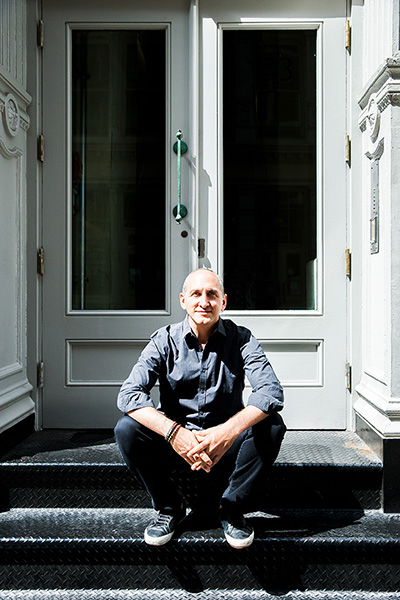
Jonathan: That’s a great question. I’ve always been deeply fascinated by my body connection, by mindset, by psychology, by somatics.
Kristen: Especially when you’ve made a hole in your intestine.
Jonathan: Yeah, there’s that.
I was the person who even later in life would just lie on a beach with a kinesiology manual simply because I was fascinated by it. I was looking to find the intersection of all of these things. Entrepreneurship, mind, body, wellness. I just started studying up on it. I found trade organizations with all sorts of industry data to find out what worked, what wasn’t working, what was the state of the industry, where were the gaps. Then I went and I actually got my first certification as a personal trainer.
Kristen: Did you ever have a moment where you thought, “Oh, my God. What have I just done?”
Jonathan: [big laughter] Many. I wouldn’t call it a moment; I’d call it a span.
Here’s the reality check on this. I knew that I had a degree. I had a license. I was still a member of the Bar Association. If things blew up, I had a retreat option. I didn’t want to go there, but in the back of my mind I can’t deny the fact that I knew that I had a fallback.
Kristen: You’re a logical thinker.
Jonathan: Yes, logical thinker but also pretty risk tolerant at the same time.
Going back there would have been disastrous for me and for my health. I went from practicing law to making $12 an hour as a personal trainer. But I’m always fascinated at learning an industry from the most basic touch point of service so I can understand the human level of one-to-one interaction.
I want to understand: How can I serve better? How can I make a life better? How can I elevate and help people?
From there, you can build something different. That’s what we did. I went off and launched my first high-end training facility.
We took off very quickly because I looked at the industry and said, let me do everything that they’re doing — differently. I knew that somebody who is in the middle years of their lives, unfit and inflexible, might be uncomfortable walking into these other locations, even though they were great.
Kristen: That’s a really good point. Even with a lot of these gyms and clubs, you feel like your body has got to be in a certain shape and you’ve got to be wearing a certain label.
Jonathan: Right. It’s like, I’ll go once I’m already there — which defeats the whole purpose. When we started, the idea was to create a center where we kept the power of the practice, but lowered barriers to participation. We did that and then signed a six-year lease for a floor in a building in New York City. And let me set the stage when this happened: I’m married with a new home and a 3-month-old baby…and it’s the day before 9/11.
Kristen: I was reading that and I thought, “Oh, wow.”
Jonathan: Yeah. WOW.
We came close to not moving forward with the project. But my sense was that the city would need what we were about to create more than ever before.
So we went ahead and opened the place in the middle of November. It was located about half a mile from some of the big piers where many of the 9/11 relief workers were staged. People were literally walking around the city, not knowing what to do, not knowing where to go. They just wanted a place to be with others and be in a community to find some way to breathe.
We changed everything about our launch and opened up our doors to whoever wanted to show up for whatever reason.
Our message was: Come, don’t pay. The community embraced us. We grew rapidly. It was an amazing experience.
Kristen: So, the million-dollar question: How do we live a good life?
Jonathan: I have a couple of answers.
Kristen: [holding up the book] A whole book of answers.
Jonathan: One thing I discovered early on is that there is no single answer that is 100 % universal to every person. I’ve had the amazing gift to sit down with hundreds of people who the world might perceive to be the most successful people in almost every domain in life, and ask them this exact question. Very rarely has the answer been the same. It surprised me, to be honest with you.
But what I started to realize is there are big patterns that emerged. When I was trying to figure out how to craft my life in a way that was deep and meaningful, there was a question I always asked myself. If an opportunity came to me, whether it was to spend time with a person, develop a friendship, build a business, whatever it may have been — I would ask myself, Will this allow me to absorb myself in activities and in relationships that fill me up while surrounding myself with people I can’t get enough of? If the answer was yes, I was in. If the answer was no, I was out. Those activities were very often a blend of fierce creativity and fierce service.
That’s the metric that I’ve been using for many years. The idea of a good life basically being a blend of what I call the three different buckets: We are each made up of a bucket of vitality, a bucket of connection and a bucket of contribution.
Kristen: You have this beautiful, succinct way of distilling a message. I kept coming back to something that you put very simply: “Do stuff that matters” and “Do epic shit.”
Jonathan: Right. Make meaning.
Kristen: You’ve come up with this great metaphor with the buckets. Everybody always talks about their bucket list as if it’s the end game.
You also alert us to the fact that buckets are vulnerable and can leak, so essentially, we’ve got to pay attention to all of them. If one bucket is at a deficit, it affects the other buckets. Right?
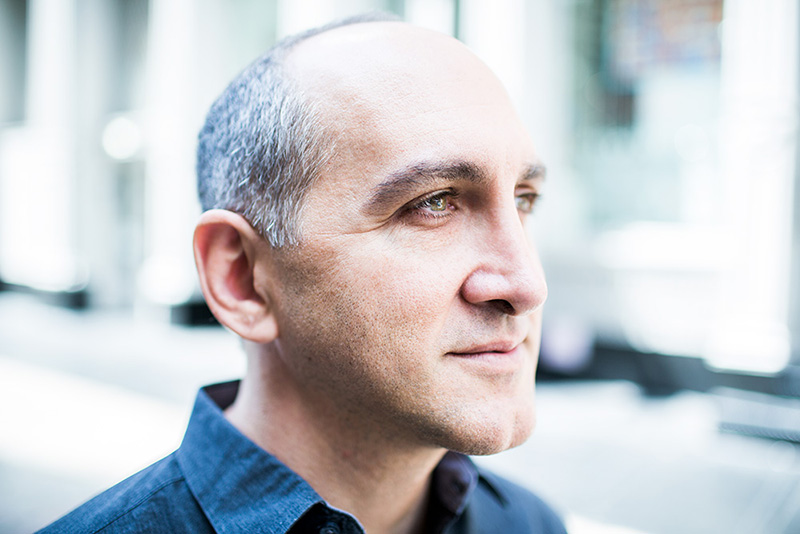
Jonathan: Yeah. Nothing operates in a vacuum in our lives. Everything is interdependent. This is why I talk about, for example, your state of mind and your state of body as one thing. They’re part of a single bucket. For years, many of us separated those things out.
Kristen: Let’s talk about the Vitality bucket.
Jonathan: There is this interdependence with everything. If you think about the Vitality bucket, we’re talking about optimizing your state of mind and your state of body. We now know that there’s a science-validated understanding that there is no separation of the two. It’s one feedback mechanism and it’s always feeding back from one side to the other. If you are physically ill, if you’re injured, if you’re in pain, it is going to immediately impact your state of mind. It has the opportunity to send you into a state of angst, anguish, depression, anxiety and other severe manifestations of the same thing. If you’re depressed or if you are just feeling blue, it is very likely to actually manifest in your body as pain, as illness.
When I talk about filling your Vitality bucket, I talk about things that address both mind and body.
Kristen: It’s amazing that we still are having this conversation.
Jonathan: It really is
Kristen: Listen, in all fairness, I’ve been there before where something really hurts. Often we can focus on what we are experiencing physically, cutting off the emotional connection, right?
Jonathan: Like behind the scenes this morning. I was a little late today because I had five things going on at once and I had a back spasm. We know where that came from.
Kristen: I once had my back go completely out on me at a really high intense stress point in my life. I wasn’t aware of those connections at the time. It was the beginning of that cracking open for me — the understanding that, “Oh, yeah. All that stress that I’ve just been having, it’s showing up right here.” And of course we’re still bombarded with pharmaceutical ads and magical pills that can make that back pain go away. Right?
Jonathan: Indeed. We love shortcuts and we love instantaneous. Our expectation of both is only getting higher and higher. We want shorter and we want more instant. Technology is really reinforcing those things.
Kristen: Now when someone says, “I have a back pain”, I immediately start thinking, what’s going on underneath all of that?
You also prompt us to take a look at where we are disconnected — looking at what’s working / what’s not working in our lives.
Jonathan: One of the things that’s really important to me about not just writing this, but about all the work that I do, whether it’s experiences that we create, programs, products, whatever it may be — is that we move beyond information. The truth is, everything we need to know has been out there for the better part of a couple thousand years, if not longer. The reason that the human condition is the human condition and there’s still so much suffering is not that we don’t know how to live better. It’s that we don’t act on what we know. The goal with everything that I do is to figure out how to deliver it in a way that somehow flips a switch.
Kristen: How do we become aware that we’re not aware?
Jonathan: That is a big question and it’s one of the first things I introduce, especially under that bucket. The truth is it’s the meta-skill because how do we know we’re not living a good life unless we’re aware of the life we’re living? Unless we actually develop the skillset to know, Am I happy or am I sad? Am I in pain or am I calm? Am I in love? Am I in friendship? Am I working fiercely? Do I care about what I’m doing or do I have no interest in it whatsoever?
Most of us actually never develop that skillset. We’re never trained in self-knowledge and we’re never given a process to discover things about ourselves to actually be able to zoom the lens out and say, Huh, what’s really happening here?
Developing an awareness practice, a mindfulness practice, to me is a foundation for pretty much everything.
Kristen: Right.
Jonathan: The goal is to actually choose how you want to live; to move out of a place where you open your eyes in the morning and you’re responding to other people’s agendas. Essentially there’s a mad dash of people in all different parts of your life demanding that you spend this day satisfying their agenda, so you react. You end up living every minute of every day in a state of reactive autopilot.
Kristen: If you were to go back to that 30-year-old you who was about to crash and to all the 30-year-olds out there, where do they start? What question do they start with?
Jonathan: To me a starting point is developing a daily practice — a daily mindfulness, a daily awareness practice. It’s not an instant thing. It’s a skillset. It’s a practice that builds over time.
For me, I wake up and I have a morning ritual. That actually started for me not in the nicest way. It started with me on my knees, trying to be okay as I was moving through a really difficult thing. It turned into something that took me from being in a lot of pain to my baseline. Then from baseline to really, really good and hyper aware.
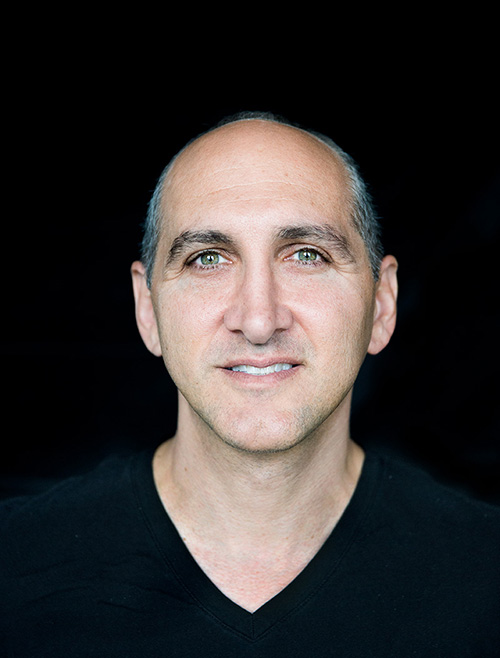
Kristen: You talk about forest bathing. It could start for someone with a walk.
Jonathan: Absolutely.
Kristen: It could be many things, but essentially what it really boils down to is settling into a genuine, centering self-care practice.
Jonathan: Yes. It’s a commitment to cultivating stillness — to cultivating the ability to, like you said, become aware of your awareness.
Kristen: Even if it means getting up a little bit earlier. Right?
Jonathan: Yes. I’m the first person who’s up at my house and I take that window, in those really quiet hours in the morning, to just be with myself.
Kristen: Those are the best hours.
Jonathan: It’s also the best creative timeframe.
Kristen: I don’t want to gloss over the fact that the book is also a practical guide for people, that you have daily prompts and explorations. Could you just give us an example of a daily exploration in the Vitality section?
Jonathan: Sure. I’ll run with one of the things you just mentioned. There’s a chapter called “Forest Bathing.” There’s actually tremendous research about how nature affects both our physiology and our psychology.
Being amongst trees, amidst nature literally increases immune response, decreases markers for inflammation, and improves mood. It has a profound effect on us.
So much so that in Japan a campaign, Shinrin-yoku, was launched to inspire people to improve their health by encouraging them to spend time in nature.
Of course, many of us don’t have forests to walk into.
Kristen: Let’s talk about that.
Jonathan: Look, I’m in the middle of New York City. I figure, okay, I’m surrounded by concrete all day long. Truth is, there are these beautiful little community gardens all over the place in the city. I’m two blocks from Central Park. You will find me there on almost a daily basis.
Even if you don’t have that, there’s research that shows that simply having a plant in view in your interior environment can change you. One of the fascinating things about that is that if you have a plant in view, it actually decreases anger dramatically.
Kristen: Wow.
Jonathan: These things make a real difference. These are the things that we can do to be okay in the world and yet, we tend to extract ourselves from that more and more. We’re suffering more and more. The human condition has not improved a whole lot.
Kristen: Onto Bucket #2: Connection.
This is the nurturing of relationships with other people, but also the relationship to yourself and then your relationship to a higher source.
Jonathan: It’s you and your knowledge and your relationship with yourself, with an intimate partner, with family members, with close friends, colleagues. It’s something that’s meaningful to you, something that’s bigger than you, whether you call it a source or God or whatever it may be. It’s also community, which a lot of us have actually forgotten.
We have a deep need to belong. If we do belong, a lot of life flourishes for us. If we don’t belong, a lot of life withers. We often don’t think about community and a sense of belonging — of being with like-minded people who share our values and aspirations and beliefs on a regular basis.
Kristen: I call them dream keepers.
Jonathan: I love that. That’s beautiful.
Community is disappearing across the board. Families are getting distributed in a way that they weren’t generations ago. Employers aren’t providing a sense of community anymore. People are fleeing faith-based organizations and communities at a faster rate than ever before in history.
Kristen: It’s like a breakdown… a disconnect.
Jonathan: We’re suffering because of it and not understanding that that’s a part of the reason that we’re suffering.
Kristen: You’re really guiding others to seek out those kinds of connections.
Jonathan: Yes, to get proactive about reclaiming that sense of belonging, and to ask, If I can’t find it, can I create it?
Kristen: Bucket #3: Contribution.
Jonathan: It’s how you’re bringing your gifts, the essence of who you are, and your creative strengths to the world. It’s interesting because we actually had a conversation about this when I was working on the book. The suggestion was to call it ‘Work’. I resisted that because ‘work’ immediately conjures an association with this thing you get paid for in the world.
Kristen: Right.
Jonathan: Sometimes it is, but sometimes it’s not.
Sometimes your greatest contribution is as a parent. Sometimes your greatest contribution is as a volunteer at an organization. Sometimes your greatest contribution is as an artist painting from 5 to 9 at night and on weekends.
You have no desire to leave the 9 to 5 gig that you get paid for because that puts a roof over your head, food on the table and gives you the freedom to not actually have to tailor the deeply meaningful creative work that you’re doing to any commercial need.
Kristen: You just segued perfectly into something I wanted to ask you. Sometimes we throw these terms around, like ‘purpose’ and ‘passion’. They begin to sound like worn out cliches, right?
There was something that you wrote, which was, “What if you don’t so much have a passion or purpose as much as you pursue something or a bunch of things with passion and a sense of purpose?” The subtle nuance of that was so beautifully displayed by a particular story. I’d love for you to tell the story of the call center.
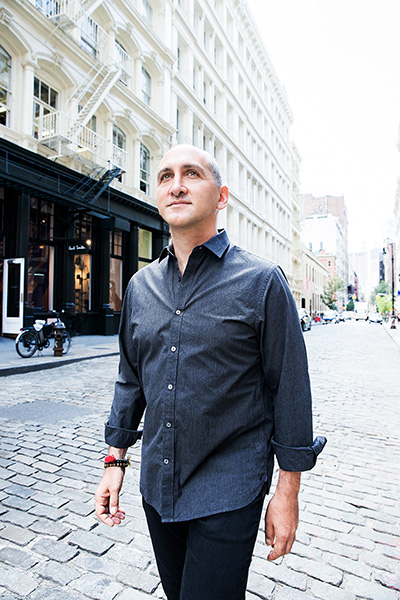
Jonathan: Yes. This was research that Adam Grant (one of the top professors at the Wharton School and who wrote the fabulous book Give and Take: Why Helping Others Drives Our Success) conducted at a call center at his university that was fundraising for scholarships. Working in a call center is a notoriously brutal job. They’re in the trenches making the calls asking for money. You almost always get no’s and people are not friendly.
Adam’s team brilliantly brought in a couple of people who had been previous recipients of the scholarships that enabled them to go through college. Some of them were the first college students in their families, people who would never have had the chance to go to college if not for these calls, that money, those scholarships. They told their stories and for the first time they actually understood: I’m not just dialing for dollars. I’m doing something that is helping change people’s lives in a tangible way. I get it now.
Kristen: Their efforts suddenly connected to something in a very real way.
Jonathan: Yes, because now it meant something. There was a sense of purpose. There was a sense of meaning that was much deeper and it changed the way that they brought themselves to the role.
Kristen: You also said, “I’m not saying stay in that job that makes you miserable — but rather, explore what’s underneath that first.”
Jonathan: Exactly.
Kristen: It might not even be the job. It might be something else that’s going on within you.
Jonathan: How many people have left a job because they’re like, Oh, this job is awful? Then they move to another job and soon enough, This job is awful. Six jobs later. Suddenly the world is against them and every job is awful.
Kristen: [laughing] What’s the common denominator?
Jonathan: There’s a really interesting line of research called Job Crafting, which really looks at the job that you’re doing and asks: Can I do this differently? Can I reengineer the way that I’m actually doing the work under the same exact job title, so it becomes more meaningful to me?
It’s actually effective at both making people happier and more fulfilled in the work that they’re doing. It’s fascinating how much more control we have over these things than we sometimes like to give ourselves credit for. My recommendation to people before they leave anything is always make it as good as you can conceivably make it.
Kristen: I also feel like there’s some passion shaming. I think some people walk around feeling like, I’m living a life full of passion and purpose. Then other people are sitting there thinking, I’m not really 100% sure what my passion and purpose is, and they’re ashamed to admit it. It starts with simply bringing passion to whatever it is you’re doing.
Jonathan: Right. Passion is not a noun. It’s an adjective.
Kristen: Bingo.
Jonathan: The key is to wake up every day and say, What can I do today that gives me that sense of purpose? Then what can I do tomorrow and the next day and the next day? You look back on the period of years and you reflect, You know what? There was never one big thing that dropped in, that one big noun that was my passion or my purpose, but I’ve lived with fierce passion and with a sense of purpose. That’s good.
Kristen: What lights you up? Where you are right now, having just turned 50?
Jonathan: Everything. This moment. My daughter, my wife, meaningful work, being in a relationship with a team of people or an incredible community of just awesome human beings, being able to create.
Look, there are drags in all of our lives. There’s negative stuff. There are struggles that I have in my life that everybody has. For me, I really try and focus on possibility as much as I can.
Kristen: Oh, you ooze possibility! This book oozes possibility.
Jonathan: Thank you. That’s largely the goal of this because that’s the place that I want to be.
Kristen: When did you know that you wanted to cultivate this community of possibility supporting entrepreneurs?
Jonathan: We’re actually in the middle of a significant shift right now. I’m a lifelong entrepreneur and I love the entrepreneurial process. Entrepreneurship is a stunning canvas for the development of human potential.
Yet, I’ve also realized over the last couple of years that that I may be less interested in entrepreneurship than I thought.
What I’m deeply interested in is how we step into that place where we feel like, Yes, when I take my last breath, I will feel like I’m fully used up and that I’ve been expressing all of myself. I’m deeply engaged with those around me. There is meaning in everything that I do.
I’m fascinated by not just how entrepreneurs do that, but how we all do that.
Kristen: Right.
Jonathan: Now I’ve realized that I’m actually starting to broaden my lens, too. If you look at the Good Life Project community, entrepreneurs are a piece of that, but now it’s really just a cool community of amazing people who just want to explore what it means to live good lives.
Kristen: I think entrepreneurs are setting the stage — they’re the trailblazers. But as you say, living a good life is not just for entrepreneurs.
Jonathan: Yes. I try and write each book with a person in mind. I literally will create a persona that I’m writing to because that allows me to have a conversation rather than just profess.
The person I wrote this for is not an entrepreneur. This is a person who is in the middle years of their lives, who has been through enough to know that there are great things and there are struggles. They have made great sacrifices. They may have lost a solid sense of identity along the way.
Kristen: I also want to give a shout-out to the men. Often men in particular are told from the time that they’re young boys growing up, Don’t bring your feelings and your emotions into your decisions, into your business, and into the way you conduct your life. Sometimes I feel like men have to break out and become entrepreneurs so that they can start to allow all of that — to unleash and connect to that humanness.
Jonathan: It’s funny. People have asked me many times, “In your mind, what’s the biggest benefit of being an entrepreneur? Is it the freedom?”
Kristen: There’s no freedom. I work 7 days a week. [laughing]
Jonathan: To me the greatest thing about being an entrepreneur is that you get to create the culture and then you get to choose the people that you bring into that culture.
Kristen: And word on the street is that you can be bribed with dark chocolate.
Jonathan: [smiling] Clearly. I can be bribed with a lot of things, nutritious and non-nutritious.
Kristen: Again, one thing I want to just come back to as we’re wrapping up the three buckets is this ‘keeping it real’ sensibility. In the chapter Bringing it Home, you said, “In between those happy thoughts is a thing called reality. Deciding you want to be happy is step one, but deciding and repeating, I’m happy, I’m happy, I’m happy, doesn’t a happy make. That’s called being a Pollyanna.”
Jonathan: We’re obsessed with happiness in this country.
The truth is you don’t live a good life by just snapping your fingers. You live a good life by doing the work, by building a practice. To me it’s not a place at which you arrive. A good life is a daily practice that over time leads to something astonishing. It took you a long time to get to your place in life now. There’s a lot of grace in understanding that the work is part of what makes the outcome. It’s part of what makes the practice so rewarding.
Kristen: There’s another video that I love of yours, #IAmWilling, which is about the paradox of change. Could you tell us about that?
Jonathan: We all want the dream outcome. We all point to something. Very few of us actually want to own the process. We want to own the outcome.
Kristen: It was a moving video. You even mentioned bigger world problems like poverty. We can all agree we want to end poverty, address climate change, and suffering in various forms. However, as you point out — we need to ask ourselves if we are really willing to own what’s necessary to do that.
Jonathan: Yes.
Kristen: I recently had the opportunity to work with youth leaders of millennials, who I think often get an unfair rap. We’re both parents of teenagers. What is your message to your daughter and to the youth? What do you want to impart to her?
Jonathan: I think about that all the time. It’s funny because my message is nothing that I could ever say to her, because as we know, kids don’t really listen to what we say. They watch what we do. My message: Find the thing that lights you up and build your life around it.
Kristen: Amen.
Jonathan: Maybe it’s your work. Maybe it’s not. Do the work to figure it out. It may take the whole first half of your life to figure it out. That’s okay. Find the activities that light you up and the relationships that light you up, and then do those things, be with those people as much as you can.
Kristen: Do you have a vulnerable bucket?
Jonathan: Vitality, for sure. For me, the thing that I have to keep pulling myself back to is vitality because I can ignore that in the name of relationships and building stuff in the world. I’m constantly engaging in my daily practice to make sure that I have a baseline commitment to filling that bucket every day.
Kristen: We have this very minute amount of time on the planet — what do you want to accomplish and how do you want to be remembered?
Jonathan: I once asked Seth Godin this question. The essence of his message was, “Don’t remember me. Remember the people who I’ve worked with and the good work that they’ve done in the world.” I would hope that in some way I would be able to make that level of difference in other people’s lives. I just want to do good work while I’m here.
Kristen: Well, I can attest to that fact that you are doing good work while you’re here, through inspiring others, through your Good Life Project, through your good life work and this fantastic new book.
I’m so grateful that our paths have crossed and that you are a member of my tribe and our Best Self family. I just want you to know that my Good Life buckets runneth over because of you. Thank you for joining us today.
Jonathan: Thanks for inviting me.
#IAmWilling video:
